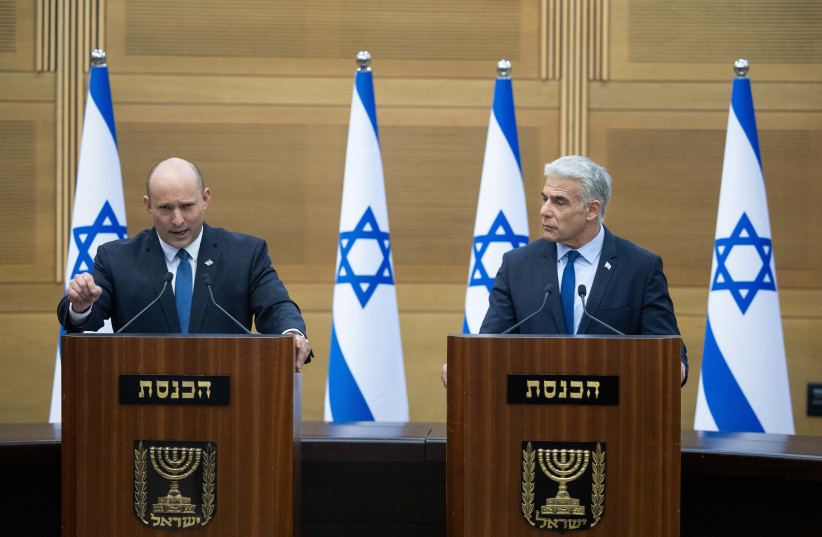Buoyed by the collapse of the Israeli coalition, Hamas and other terror groups have threatened to continue carrying out attacks against Israel.
The groups said that they see the collapse of the government of Prime Minister Naftali Bennet as a direct result of its failure to confront the Palestinian “resistance” factions, especially during and after last year’s war between Hamas and Israel.
The terror groups’ appetite is likely to increase after the collapse of the coalition, paving the way for increased attacks against Israel, especially in the West Bank, during the period leading up to the next general elections in Israel.
Hamas and Palestinian Islamic Jihad officials were quoted as saying that the collapse of the coalition was a sign of Israel’s “fragility” and “weakness.” They said that the Gaza-based groups will remain on high alert to “thwart” a new Israeli “aggression against the Palestinian people.”
Several Palestinians said that they did not rule out the possibility that the terror groups may exploit the period before the elections to step up their attacks against Israelis because of their belief that an interim government would be very weak and unwilling to engage in new hostilities.

Even before the political drama in Israel unfolded, Hamas and PIJ gunmen in the Jenin area threatened to continue carrying out terror attacks, particularly after the killing of several of their friends by the IDF during the past few weeks.
“We could see an escalation [with Israel], but not necessarily in the Gaza Strip,” said a Palestinian political analyst in Ramallah. “Hamas and the Palestinian factions are not interested, at this stage, in another round of fighting with Israel. However, they would like to see more violence in the West Bank because that is bad for both Israel and the Palestinian Authority. In the next few months, we are likely to see an upsurge in violent attacks [against Israel] emanating from the West Bank. It’s because of the belief that an interim government would not be interested in war.”
Are Palestinian factions underestimating Israel?
Some Palestinians warned against underestimating the power of an interim government in Israel.
“For the next four months, Israel will have a stable government,” noted Fayez Abu Shamaleh, a senior political analyst in the Hamas-ruled Gaza Strip. “This government would be able to wage war without having to worry about a vote of no confidence [in the Knesset] or threats to dissolve the coalition.”
Abu Shamaleh claimed that Israel was planning to escalate tensions in the region “after reaping the fruits” of US President Joe Biden’s visit to the region, which is slated for next month.
The Palestinian groups, he added, are also planning to escalate the situation ahead of Biden’s visit in order to foil it. “Escalation is coming anyway,” the analyst stressed.
Israel witnessing 'political vacuum, confusion'
Commenting on the coalition crisis in Israel, Hamas spokesman Hazem Qassem said that Israel has been witnessing “a political vacuum and confusion” since last year’s war.
“The resistance revealed the fragility of the Zionist entity and the extent of its weakness, and it proved its ability to act, influence and rise despite all the changes around it,” Qassem argued. “The changes [in the Israeli government] are the result of [Israel’s] weakness and fragility. The state of disintegration of the occupation should serve as a real message for all parties that seek normalization with the occupation.”
The Hamas spokesperson said that “all the prime ministers of Israel came to power after promising to defeat Hamas.
“But Hamas is getting stronger and its presence today is more powerful and influential,” he added. “Hamas has become a nightmare for the [Israeli] politicians.”
"Hamas has become a nightmare for the [Israeli] politicians.”
Hamas spokesman Hazem Qassem
Ahmed al-Mudallal, a senior PIJ official, claimed that the terror groups played a “major role” in bringing about the collapse of the Israeli coalition.
He claimed that the Palestinian groups managed to confuse the Israeli political scene “through the continuation of the resistance.”
Mudallal said that “the state of conflict between the resistance and the Zionist enemy will continue,” notwithstanding the political developments in Israel.
He added: “All the occupation governments were unable to provide security and stability for the Zionist community. The more Zionist extremism against the Palestinian people increases, the more the Palestinian people cling to their rights and resist the Zionist occupation.”
